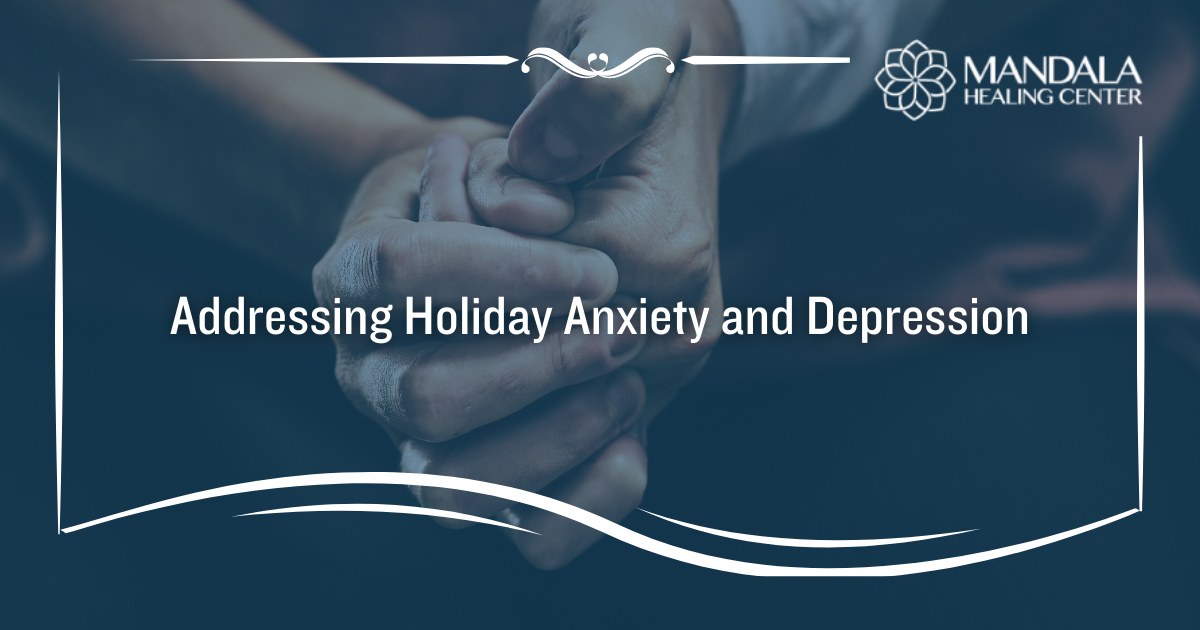Addressing Holiday Anxiety and Depression
The stress associated with holiday shopping, traveling and social gatherings can certainly accentuate everyday feelings of concern, worry and nervousness. Reassuring ourselves that there are a number of steps we can take when these negative feelings increase is important to helping us manage the situational sadness associated with this particular season.
Despite being surrounded by friends and family who care about us, we may experience an overwhelming sense of loneliness during a time when it seems everywhere we look the rest of the world is having fun. Assuming we are the only ones who feel this way during the holidays may further intensify our tendency to ruminate more than usual on regrets and failures.
Feelings of discouragement, sadness and disinterest that last for a short period of time are referred to as “the blues.” A lack of motivation mixed with a short-lasting bout (or two) of hopelessness is not uncommon.
Nervousness about the future may combine with feelings of dismay over past decisions and failures. Our minds are simultaneously flooded with commercialized messages of perfection from magazines, radio and TV along with our own unrealistic expectations for personal celebrations.
Strained family reunions and extended houseguests interfere with longstanding daily work routines, sleeping patterns and dietary needs. For individuals recovering from addictions like overeating and compulsive shopping, or alcohol and drug misuse, the holidays may feel dangerous.
Be on the lookout for post-New Year’s Day letdown. Emotional disappointments experienced during the November and December holidays can compound in January due to sickness, physical fatigue and exhaustion.
Dealing with these seasonal blues is not easy. However, there are several things you can do:
- Schedule quiet time just for you to offset the extra hours spent arranging special activities for your friends and family members.
- Create a safe space for expressing your feelings of sadness and loneliness.
- Organize and prioritize your time. Be realistic about your emotional abilities and financial resources.
- Don’t spend all your precious time with visiting loved ones cooking, cleaning, shopping and preparing for one perfect, unattainable day.
- Remember the past fondly, but release your expectations of the “good old days” of your childhood. Make new memories instead.
- Enjoy free activities like brewing a cup of hot chocolate and walking your dog around the neighborhood to enjoy the Christmas lights.
- Volunteer an hour or two doing something nice for others.
- Seek out time with supportive people who truly care about you.
Anxiety
It’s useful to know the signs of anxiety in case the holiday blues persist. The Anxiety and Depression Association of America (ADAA) explains that although anxiety disorders are different than depression, people with depression often experience symptoms similar to those of an anxiety disorder. These ongoing symptoms may include irritability, nervousness, problems sleeping and difficulty concentrating.
Anxiety disorders and depression each have unique causes and emotional and behavioral symptoms. Although many people who develop depression have a history of an anxiety disorder earlier in life, there’s no evidence that one disorder causes the other, despite the fact that many people suffer from both disorders. If anxious feelings last for more than two weeks and begin to interfere with self-care, daily family activities, social obligations or work or school attendance, it’s important to seek professional assistance.
Depression
According to the National Institute of Mental Health (NIMH), people with depressive illnesses experience a wide variety of symptoms depending on the individual and his or her particular medical condition. The frequency, severity and duration of symptoms are quite different for each person and may include:
- Persistent sad, anxious, or empty feelings
- Ongoing sense of hopelessness or pessimism
- Irritability and restlessness
- Feelings of guilt, worthlessness, or helplessness
- Loss of interest in pleasurable activities or hobbies, including sex
- Fatigue and decreased energy
- Problems with concentration, memory and decision-making
- Insomnia, early-morning wakefulness, or excessive sleeping
- Overeating or appetite loss
- Aches, pains and persistent headaches
- Cramps or digestive problems unresponsive to treatment
- Thoughts of suicide or suicide attempts
If you or someone you know is in crisis, get help immediately. Don’t isolate yourself, and don’t leave your relative or friend alone. Reach out to your doctor, go to the nearest emergency room or call 911. Contact help via the 24-hour, toll-free National Suicide Prevention Lifeline at 1-800-273-TALK (1-800-273-8255); TTY: 1-800-799-4TTY (4889) and talk to a trained counselor.
Resources:
“Understanding the Facts: Depression,” Anxiety and Depression Association of America, October 2015
“Depression,” National Institute of Mental Health, 2011
“Tips on How to Cope with Holiday Depression and Stress,” Indiana University of Pennsylvania via the National Mental Health Association, December 2015
Addiction Recovery Program at Mandala Healing Center
Call the Mandala Healing Center today to begin planning a healing journey that is tailored to your individual needs. Our expert counselors at 866-830-3211 are available 24/7 to verify insurance coverage and begin the enrollment process.












